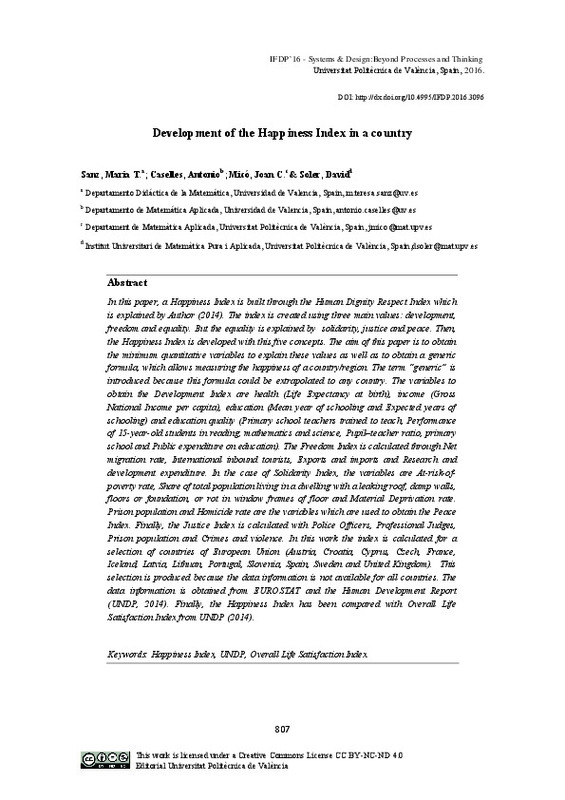JavaScript is disabled for your browser. Some features of this site may not work without it.
Buscar en RiuNet
Listar
Mi cuenta
Estadísticas
Ayuda RiuNet
Admin. UPV
Development of the Happiness Index in a country
Mostrar el registro sencillo del ítem
Ficheros en el ítem
| dc.contributor.author | Sanz García, María
|
es_ES |
| dc.contributor.author | Caselles, Antonio
|
es_ES |
| dc.contributor.author | Micó Ruiz, Juan Carlos
|
es_ES |
| dc.contributor.author | Soler Fernández, David
|
es_ES |
| dc.date.accessioned | 2018-03-15T09:53:51Z | |
| dc.date.available | 2018-03-15T09:53:51Z | |
| dc.date.issued | 2016-10-27 | |
| dc.identifier.isbn | 9788490484401 | |
| dc.identifier.uri | http://hdl.handle.net/10251/99424 | |
| dc.description.abstract | [EN] In this paper, a Happiness Index is built through the Human Dignity Respect Index which is explained by Author (2014). The index is created using three main values: development, freedom and equality. But the equality is explained by solidarity, justice and peace. Then, the Happiness Index is developed with this five concepts. The aim of this paper is to obtain the minimum quantitative variables to explain these values as well as to obtain a generic formula, which allows measuring the happiness of a country/region. The term “generic” is introduced because this formula could be extrapolated to any country. The variables to obtain the Development Index are health (Life Expectancy at birth), income (Gross National Income per capita), education (Mean year of schooling and Expected years of schooling) and education quality (Primary school teachers trained to teach, Performance of 15-year-old students in reading, mathematics and science, Pupil–teacher ratio, primary school and Public expenditure on education). The Freedom Index is calculated through Net migration rate, International inbound tourists, Exports and imports and Research and development expenditure. In the case of Solidarity Index, the variables are At-risk-ofpoverty rate, Share of total population living in a dwelling with a leaking roof, damp walls, floors or foundation, or rot in window frames of floor and Material Deprivation rate. Prison population and Homicide rate are the variables which are used to obtain the Peace Index. Finally, the Justice Index is calculated with Police Officers, Professional Judges, Prison population and Crimes and violence. In this work the index is calculated for a selection of countries of European Union (Austria, Croatia, Cyprus, Czech, France, Iceland, Latvia, Lithuan, Portugal, Slovenia, Spain, Sweden and United Kingdom). This selection is produced because the data information is not available for all countries. The data information is obtained from EUROSTAT and the Human Development Report (UNDP, 2014). Finally, the Happiness Index has been compared with Overall Life Satisfaction Index from UNDP (2014). | es_ES |
| dc.format.extent | 12 | es_ES |
| dc.language | Inglés | es_ES |
| dc.publisher | Editorial Universitat Politècnica de València | es_ES |
| dc.relation.ispartof | Systems&design:beyond processes and thinking | es_ES |
| dc.rights | Reconocimiento - No comercial - Sin obra derivada (by-nc-nd) | es_ES |
| dc.subject | Happiness index | es_ES |
| dc.subject | UNDP | es_ES |
| dc.subject | Overall Life Satisfaction Index | es_ES |
| dc.title | Development of the Happiness Index in a country | es_ES |
| dc.type | Capítulo de libro | es_ES |
| dc.type | Comunicación en congreso | es_ES |
| dc.identifier.doi | 10.4995/IFDP.2016.3096 | |
| dc.rights.accessRights | Abierto | es_ES |
| dc.contributor.affiliation | Universitat Politècnica de València. Instituto Universitario de Matemática Multidisciplinar - Institut Universitari de Matemàtica Multidisciplinària | es_ES |
| dc.contributor.affiliation | Universitat Politècnica de València. Escuela Técnica Superior de Ingenieros Industriales - Escola Tècnica Superior d'Enginyers Industrials | es_ES |
| dc.contributor.affiliation | Universitat Politècnica de València. Escuela Técnica Superior de Gestión en la Edificación - Escola Tècnica Superior de Gestió en l'Edificació | es_ES |
| dc.contributor.affiliation | Universitat Politècnica de València. Departamento de Matemática Aplicada - Departament de Matemàtica Aplicada | es_ES |
| dc.description.bibliographicCitation | Sanz García, M.; Caselles, A.; Micó Ruiz, JC.; Soler Fernández, D. (2016). Development of the Happiness Index in a country. En Systems&design:beyond processes and thinking. Editorial Universitat Politècnica de València. 807-818. https://doi.org/10.4995/IFDP.2016.3096 | es_ES |
| dc.description.accrualMethod | OCS | es_ES |
| dc.relation.conferencename | Systems & Design: Beyond Processes and Thinking | es_ES |
| dc.relation.conferencedate | June 22-24,2016 | es_ES |
| dc.relation.conferenceplace | Valencia, Spain | es_ES |
| dc.relation.publisherversion | http://ocs.editorial.upv.es/index.php/IFDP/IFDP/paper/view/3096 | es_ES |
| dc.description.upvformatpinicio | 807 | es_ES |
| dc.description.upvformatpfin | 818 | es_ES |
| dc.type.version | info:eu-repo/semantics/publishedVersion | es_ES |
| dc.relation.pasarela | OCS\3096 | es_ES |








